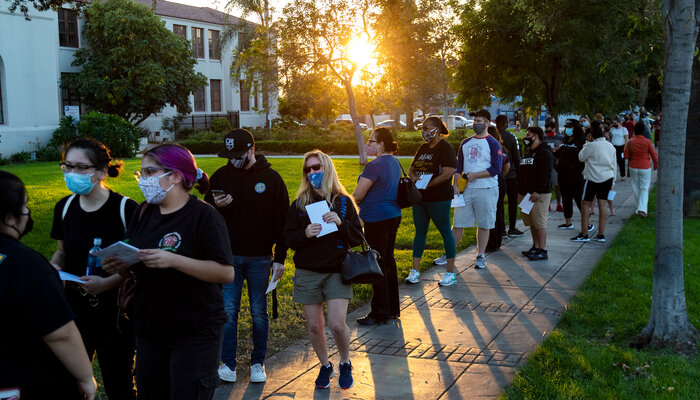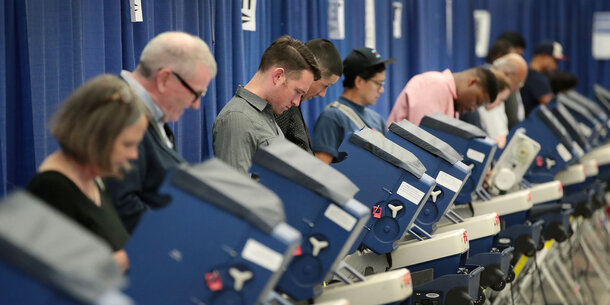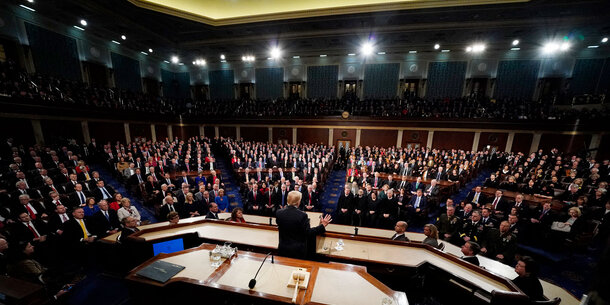Latino political participation in the United States is on the rise, but a wave of voting restrictions and other harmful laws sweeping through the states is jeopardizing Latino political power, particularly in states like Arizona and Texas.
Fortunately, the Freedom to Vote: John R. Lewis Act would counter many of the worst efforts to suppress the vote of communities of color. The bill would set baseline national standards to protect voting rights and undo harmful Supreme Court decisions, ensuring that the voices of all Americans are heard.
As President Biden said in his address from Georgia this week, it is critical that the Senate act without delay. “This is the moment to decide. To defend our elections. To defend our democracy.”
Racist efforts to suppress Latino political power in the United States are nothing new, especially in states with large Latino populations. For over 60 years, for example, Arizona law required voters to pass an English literacy test in order to register to vote. The authors of the 1909 law stated their intention plainly: to block the “ignorant Mexican vote.” Whites-only primaries, designed to suppress the Black vote in Southern states, were implemented in Texas in 1923 to bar Latinos from participation in crucial primary elections. More recently, despite some legal advances, intimidation, harassment, onerous proof-of-citizenship requirements, and other efforts to suppress the Latino vote have persisted.
The Voting Rights Act of 1965 was an essential step towards remedying such voter suppression. The law prohibits discrimination against racial and ethnic minorities in access to the vote and was amended in 1975 to protect Spanish-speaking populations and other language minorities. Until 2013, it also required states and localities with a history of racial discrimination in voting to obtain federal approval for changes to voting laws, a process known as “preclearance.” But that year, the Supreme Court gutted the preclearance power in Shelby County v. Holder. And last year, the Court further weakened the Voting Rights Act when it upheld two discriminatory Arizona voting policies — which disproportionately burden Latinos — in Brnovich v. DNC.
These decisions have contributed to a resurgence in efforts to suppress the votes of Latinos and other people of color as their population numbers grow. States have passed hundreds of restrictive voting laws that shortened early voting periods, closed polling places, established aggressive voter roll purges, and more.
Today, we are at a crisis point. Former President Trump made demonizing Latinos a central component of his campaign and spread malicious lies, like the false claim that millions of noncitizens voted illegally. His efforts to sow division and undermine American elections led to a violent insurrection at the Capitol and an enduring antidemocratic movement rooted in white supremacy.
State legislators have followed this lead, amping up voter suppression efforts. In the past year, 19 states enacted 34 restrictive voting laws, with more expected in 2022. Some of the worst laws have been passed in states with growing Latino populations, including Florida, Arizona, and Texas. In Texas, the new law would make it harder for Spanish speakers to get help casting their ballots, establish monthly citizenship checks that have consistently purged eligible voters from the rolls in error, and ban 24-hour and drive-thru voting (both of which were pandemic-safe alternatives to in-person voting that voters of color relied upon more heavily than white voters in 2020).
As part of our current redistricting cycle, lawmakers across the country are also diluting the power of Latino voters through extreme gerrymandering. Activists in Arizona have expressed concern that the state’s new maps could limit the voices of Latino and Native voters. Under the Freedom to Vote Act, Arizona’s redistricting plan would trigger the bill’s presumption of partisan bias, allowing interested parties to challenge the bills in court.
Luckily, the major democracy reform bill pending in the Senate can blunt the worst damage. Not only does the Freedom to Vote Act ban partisan gerrymandering, it guarantees early and no-excuse mail voting, curbs discriminatory voter roll purges, counters long lines at the polls, and much more.
Since states may still try to discriminate, the John R. Lewis Voting Rights Advancement Act restores the Voting Rights Act to full force, undoing the Supreme Court decisions in Shelby County and Brnovich. These bills have majority support — all that stands in their way is the Senate’s 60-vote threshold for defeating a filibuster. But the filibuster can be modified, as it has been many times before.
Latinos, who accounted for more than half of the country’s population growth over the last decade, deserve to have their votes counted. Their strengthened political power would mean a government that better reflects their needs. Congress can help our nation come closer to the ideal — a multiracial democracy where all can participate — by doing whatever it takes to make these essential democracy reforms become law.



